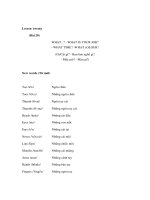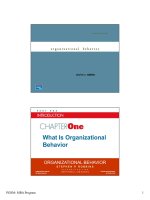OB11 chapter 1 WHat is organizational behavior
Bạn đang xem bản rút gọn của tài liệu. Xem và tải ngay bản đầy đủ của tài liệu tại đây (732.36 KB, 42 trang )
eleventh edition
organizational
behavior
stephen p. robbins
Chapter One
What Is Organizational
Behavior
ORGANIZATIONAL BEHAVIOR
S T E P H E N P. R O B B I N S
E L E V E N T H
© 2005 Prentice Hall Inc.
All rights reserved.
E D I T I O N
WWW.PRENHALL.COM/ROBBINS
PowerPoint Presentation
by Charlie Cook
OBJECTIVES
LEARNING
After studying this chapter,
you should be able to:
1. Define organizational behavior (OB).
2. Describe what managers do.
3. Explain the value of the systematic study of
OB.
4. List the major challenges and opportunities for
managers to use OB concepts.
5. Identify the contributions made by major
behavioral science disciplines to OB.
© 2005 Prentice Hall Inc.
All rights reserved.
1–3
O B J E C T I V E S (cont’d)
LEARNING
After studying this chapter,
you should be able to:
6. Describe why managers require a knowledge
of OB.
7. Explain the need for a contingency approach
to the study of OB.
8. Identify the three levels of analysis in this
book’s OB model.
© 2005 Prentice Hall Inc.
All rights reserved.
1–4
What
What Managers
Managers Do
Do
Managers (or administrators)
Individuals who achieve goals through other people.
Managerial
ManagerialActivities
Activities
••Make
Makedecisions
decisions
••Allocate
Allocateresources
resources
••Direct
Directactivities
activitiesof
ofothers
others
to
toattain
attaingoals
goals
© 2005 Prentice Hall Inc.
All rights reserved.
1–5
Where
Where Managers
Managers Work
Work
Organization
A consciously coordinated social unit,
composed of two or more people, that
functions on a relatively continuous basis
to achieve a common goal or set of
goals.
© 2005 Prentice Hall Inc.
All rights reserved.
1–6
Management
Management Functions
Functions
Planning
Planning
Organizing
Organizing
Management
Management
Functions
Functions
Controlling
Controlling
© 2005 Prentice Hall Inc.
All rights reserved.
Leading
Leading
1–7
Management
Management Functions
Functions (cont’d)
(cont’d)
Planning
A process that includes defining goals,
establishing strategy, and developing
plans to coordinate activities.
© 2005 Prentice Hall Inc.
All rights reserved.
1–8
Management
Management Functions
Functions (cont’d)
(cont’d)
Organizing
Determining what tasks are to be done,
who is to do them, how the tasks are to
be grouped, who reports to whom, and
where decisions are to be made.
© 2005 Prentice Hall Inc.
All rights reserved.
1–9
Management
Management Functions
Functions (cont’d)
(cont’d)
Leading
A function that includes motivating
employees, directing others, selecting
the most effective communication
channels, and resolving conflicts.
© 2005 Prentice Hall Inc.
All rights reserved.
1–10
Management
Management Functions
Functions (cont’d)
(cont’d)
Controlling
Monitoring activities to ensure they are being
accomplished as planned and correcting any
significant deviations.
© 2005 Prentice Hall Inc.
All rights reserved.
1–11
Mintzberg’s
Mintzberg’s Managerial
Managerial Roles
Roles
© 2005 Prentice Hall Inc.
All rights reserved.
Source: Adapted from The Nature of Managerial Work by H. Mintzberg. Copyright © 1973
by H. Mintzberg. Reprinted by permission of Pearson Education.
E X H I B I T 1–1
E X H I B I T 1–1
1–12
Mintzberg’s
Mintzberg’s Managerial
Managerial Roles
Roles (cont’d)
(cont’d)
© 2005 Prentice Hall Inc.
All rights reserved.
Source: Adapted from The Nature of Managerial Work by H. Mintzberg. Copyright © 1973
by H. Mintzberg. Reprinted by permission of Pearson Education.
E X H I B I T 1–1 (cont’d)
E X H I B I T 1–1 (cont’d)
1–13
Mintzberg’s
Mintzberg’s Managerial
Managerial Roles
Roles (cont’d)
(cont’d)
© 2005 Prentice Hall Inc.
All rights reserved.
Source: Adapted from The Nature of Managerial Work by H. Mintzberg. Copyright © 1973
by H. Mintzberg. Reprinted by permission of Pearson Education.
E X H I B I T 1–1 (cont’d)
E X H I B I T 1–1 (cont’d)
1–14
Management
Management Skills
Skills
Technical skills
The ability to apply specialized
knowledge or expertise.
Human skills
The ability to work with, understand,
and motivate other people, both
individually and in groups.
Conceptual Skills
The mental ability to analyze and
diagnose complex situations.
© 2005 Prentice Hall Inc.
All rights reserved.
1–15
Effective
Effective Versus
Versus Successful
Successful Managerial
Managerial
Activities
Activities (Luthans)
(Luthans)
1.
1.Traditional
Traditionalmanagement
management
• •Decision
Decisionmaking,
making,planning,
planning,and
andcontrolling
controlling
2.
2.Communication
Communication
• •Exchanging
Exchangingroutine
routineinformation
informationand
andprocessing
processing
paperwork
paperwork
3.
3.Human
Humanresource
resourcemanagement
management
• •Motivating,
Motivating,disciplining,
disciplining,managing
managingconflict,
conflict,staffing,
staffing,
and
andtraining
training
4.
4.Networking
Networking
• •Socializing,
Socializing,politicking,
politicking,and
andinteracting
interactingwith
withothers
others
© 2005 Prentice Hall Inc.
All rights reserved.
1–16
Allocation
Allocation of
of Activities
Activities by
by Time
Time
© 2005 Prentice Hall Inc.
All rights reserved.
Source: Based on F. Luthans, R.M. Hodgetts, and S.A. Rosenkrantz,
Real Managers (Cambridge, MA: Ballinger, 1988).
E X H I B I T 1–2
E X H I B I T 1–2
1–17
Enter
Enter Organizational
Organizational Behavior
Behavior
Organizational behavior
(OB)
A field of study that
investigates the impact that
individuals, groups, and
structure have on behavior
within organizations, for the
purpose of applying such
knowledge toward improving
an organization’s effectiveness.
© 2005 Prentice Hall Inc.
All rights reserved.
1–18
Replacing
Replacing Intuition
Intuition with
with Systematic
Systematic Study
Study
Intuition
A feeling not necessarily supported by research.
Systematic study
Looking at relationships, attempting to attribute
causes and effects, and drawing conclusions based
on scientific evidence.
a means
©Provides
2005 Prentice
Hall to
Inc.predict behaviors.
All rights reserved.
1–19
Replacing
Replacing Intuition
Intuition with
with Systematic
Systematic Study
Study
Preconceived
Notions
© 2005 Prentice Hall Inc.
All rights reserved.
≠
The
Facts
1–20
Toward
Towardan
an OB
OB Discipline
Discipline
© 2005 Prentice Hall Inc.
All rights reserved.
E X H I B I T 1–3
E X H I B I T 1–3
1–21
Contributing
Contributing Disciplines
Disciplines to
to the
the OB
OB Field
Field
Psychology
The science that seeks to measure, explain, and sometimes
change the behavior of humans and other animals.
© 2005 Prentice Hall Inc.
All rights reserved.
E X H I B I T 1–3 (cont’d)
E X H I B I T 1–3 (cont’d)
1–22
Contributing
Contributing Disciplines
Disciplines to
to the
the OB
OB Field
Field (cont’d)
(cont’d)
Sociology
The study of people in relation to their fellow human beings.
© 2005 Prentice Hall Inc.
All rights reserved.
E X H I B I T 1–3 (cont’d)
E X H I B I T 1–3 (cont’d)
1–23
Contributing
Contributing Disciplines
Disciplines to
to the
the OB
OB Field
Field (cont’d)
(cont’d)
Social Psychology
An area within psychology that blends concepts from psychology
and sociology and that focuses on the influence of people on one
another.
© 2005 Prentice Hall Inc.
All rights reserved.
E X H I B I T 1–3 (cont’d)
E X H I B I T 1–3 (cont’d)
1–24
Contributing
Contributing Disciplines
Disciplines to
to the
the OB
OB Field
Field (cont’d)
(cont’d)
Anthropology
The study of societies to learn about human beings and their
activities.
© 2005 Prentice Hall Inc.
All rights reserved.
E X H I B I T 1–3 (cont’d)
E X H I B I T 1–3 (cont’d)
1–25









